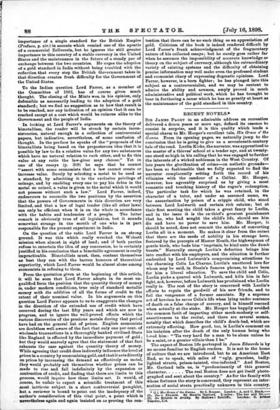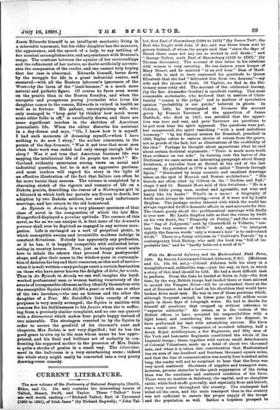RECENT NOVELS.* SIR JAMES PAGET in an admirable address on
recreation delivered a dozen years or more ago, defined its essence to consist in surprise, and it is this quality which lends a special charm to Mr. Hooper's excellent tale, His Grace o' the Gunne. From its opening pages, we naturally jump to the conclusion that he is going to give us a seventeenth-century tale of the road. Lurlin Kirke, the narrator, was apprenticed to the master of a thieves' school at a tender age, and at twenty- one stood so high in his calling that he was engaged to further the interests of a wicked nobleman in the West Country. Of late years the glorification of crime—on aesthetic grounds— has been so fashionable that we fully expected to find the narrator complacently setting forth the record of his villainies with the candour of a Cellini. Mr. Hooper, however, has agreeably surprised us by giving a most romantic and touching history of the rogue's redemption. The particular task for which he was retained, in the character of a tutor, and under an assumed name, wa the assassination by poison of a cripple child, who stood between Lord Lulworth and certain rich estates; but at their first meeting the child takes a great fancy to Lurlin, and in the issue it is the ex-thief's greatest punishment that he, who had sought the child's life, should see him die and have no power to save him. Mr. Hooper, it should be noted, does not commit the mistake of converting Lurlin all in a moment. He makes it clear from the outset that there are the seeds of nobility in his strange hero, fostered by the precepts of Master Heath, the highwayman of gentle birth, who bade him "imprimis, be kind unto the dumb beasts." Naturally enough Lurlin's defection brings him into conflict with his employers, and the situation is further embroiled by Lord Lulworth's compromising attentions to the charming Celia La Charme, Lurlin's unuttered love for whom may be said, in Steele's famous phrase, to have been for him a liberal education. To save the child and Celia, Lurlin picks a quarrel with Lulworth, and kills him in fair fight, not, however, before Lulworth has proclaimed who Lurlin really is. The rest of the story is concerned with Lurlin's efforts to regain the goodwill of his new friends, and to foil the vengeance of a former associate. By a supreme act of heroism he saves Celia's life when lying under sentence of death on a false charge of sorcery, and is himself rescued when actually at the stake. Mr. Hooper has happily avoided the common fault of imparting either mock-modesty or self- assertiveness to the recital, and there are several scenes, notably that which describes the child's death-bed, which are extremely affecting. How good, too, is Lurlin's comment on his isolation after the death of the only human being who loved him : "'Tis very hard for a man to be alone unless he be a saint, or a greater villain than I be."
The aspect of Boston life portrayed in Jason Edwards is by no means familiar to English readers. It is not to the home of culture that we are introduced, but to an American East End, so to speak, with miles of " ugly, graceless, badly- lighted streets, poison-tainted, vice-infected." And Boston, Mr. Garland tells us, is "predominantly of this general
character The real Boston does not get itself photo- graphed and sent about the country." As for the family with whose fortunes the story is concerned, they represent an inter- section of social strata practically unknown in this country.
• (1) His Grace o' the Gunne. By I. Hooper. London : A. and C. Black.— (2). Jas Edtrards. By Hamlin Garland. Inndou ker and Co.— (3). An Episode in Arcady. By Halliwe 1 Butchfid. London: 0. Arthur Pearson, Ltd.
Jason Edwards himself is an intelligent mechanic, living in a miserable tenement, but his elder daughter has the manners, the appearance, and the speech of a lady, to say nothing of her musical accomplishments, and acquaintance with Brabms's songs. The contrast between the squalor of her surroundings and the refinement of her nature, no doubt artificially accentu- ates the compassion of the reader, and one cannot help hoping that her case is abnormal. Edwards himself, borne down by the struggle for life in a great industrial centre, and ensnared—with all the Eastern labourer's ignorance of the West—by the lures of the " land-boomer," is a much more natural and pathetic figure. Of course he fares even worse on the prairie than in the Boston foundry, and when the energetic and prosperous young journalist who loves his daughter comes to the rescue, Edwards is ruined in health as well as in fortune. His patient, uncomplaining wife, who only managed to " keep goin' by thinkin' how much worse some other folks is off," is excellently drawn, and there are some significant touches in the sketches of American journalistic life. When the editor disturbs his assistant in a day-dream and says, " Oh, I know how it is myself. I had such moments of dreaming myself,—when I have nothing to do now I sleep," the author comments, in the person of the day-dreamer, " Was it not true that most men when their work was ended had only energy enough left to sleep ? Was it not true that American business life was sapping the intellectual life of its people too much ? " Mr. Garland evidently entertains strong views on social and industrial questions, but he is not an aggressive partisan, and most readers will regard his story in the light of an effective illustration of the fact that failure can often be far more heroic than success. The volume is completed by a charming sketch of the rigours and romance of life on a Dakota prairie, describing the rescue of a Norwegian girl in a blizzard in which both her parents are frozen to death, her adoption by two Dakota settlers, her early and unfortunate marriage, and her return to the old homestead.
An Episode in Arcady is a very pleasant specimen of that class of novel in the composition of which the late Mrs. Hungerford displayed a peculiar aptitude. The essence of this novel, so far as we can analyse it, is that none of the dramatis persona shall ever be depicted as engaged in any serious occu- pation. Life is envisaged as a sort of perpetual picnic, in which susceptible swains and irresistible maidens indulge in constant flirtations. Nobody has apparently any profession, er if he has, it is happily compatible with unlimited lotus- eating in country houses. Now, just as hungry street arabs love to inhale the odours that proceed from pastrycooks' shops, and glue their noses to the window-pane in contempla- tion of dainties far beyond their resources, so this sort of novel— when it is well-written—may perhaps exert a certain fascination on those who have never known the delights of dolce far niente. Thus in An Episode in Arcady we can well imagine the hard- worked professional man or woman tasting vicariously of the sweets of irresponsible idleness as they identify themselves with the susceptible Squire (with £6,000 a year) or with one or other of the two heroines,—the one an heiress and the other the daughter of a Peer. Mr. Sutcliffe's little comedy of cross purposes is very neatly arranged; the Squire is smitten with remorse for his faithlessness to his fiancee when she is suffer- ing from a precisely similar complaint, and no one can quarrel with a dgnouement which makes four people happy instead of two miserable. The stratagem resorted to by the Squire in order to secure the goodwill of his charmer's aunt and chaperon, Mrs. Dalsie, is not very dignified ; but he has the good grace to own up to the man whose name he has appro- priated, and his final and brilliant act of audacity in con- fronting his supposed mother in the presence of Mrs. Dalsie is quite a stroke of genius in a small way. The eclaircisse- orient in the ball-room is a very entertaining scene ; indeed the whole story might easily be converted into a very pretty drawing-room comedy.



































 Previous page
Previous page